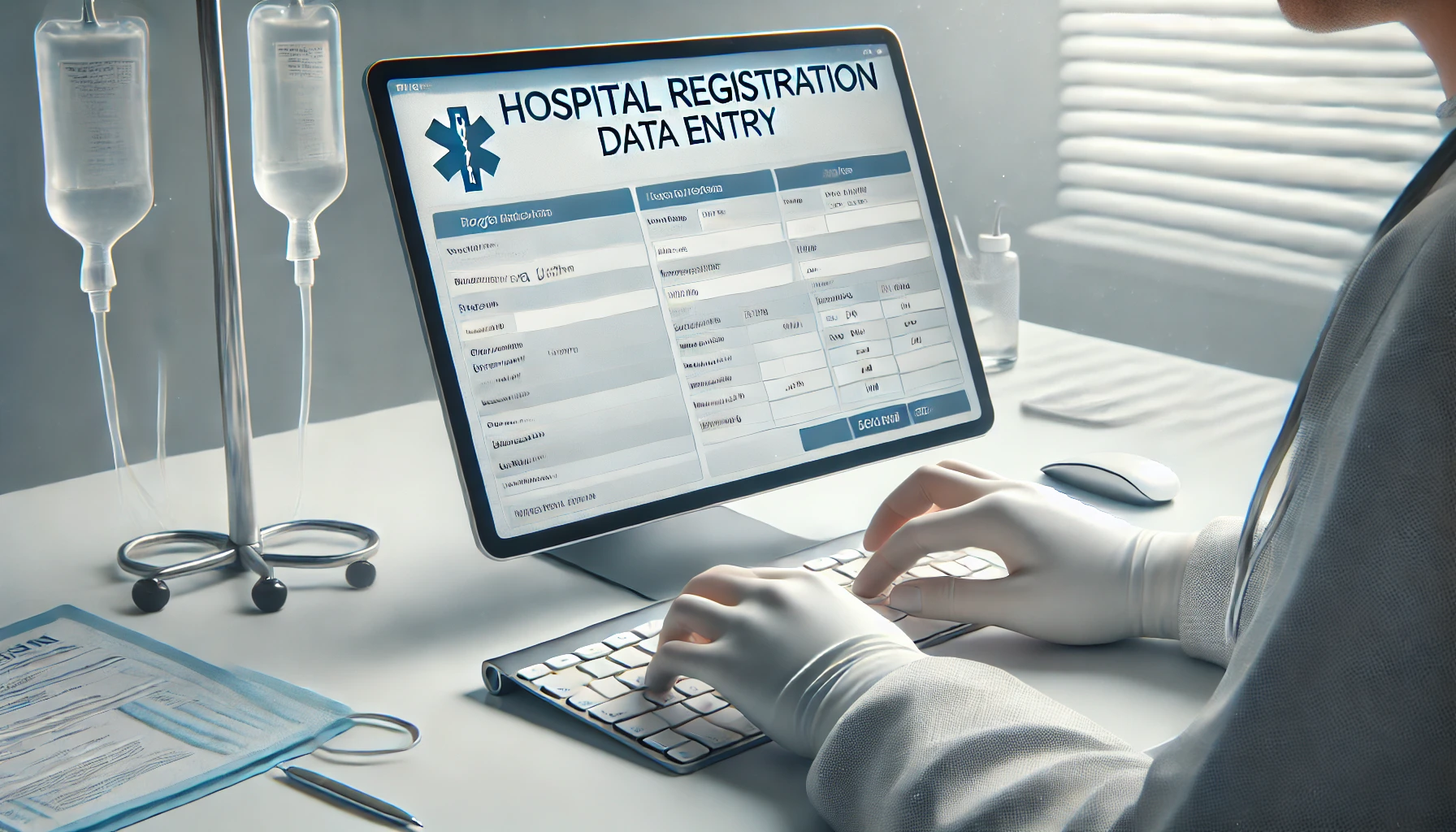Have you ever considered the critical role that each component of hospital registration data entry plays in ensuring seamless patient care delivery and information accuracy? From capturing precise patient demographics to navigating legal compliance intricacies, each step in this process is vital for maintaining operational efficiency and safeguarding patient confidentiality. Understanding the nuances of these seven key components can significantly impact the quality of care provided within healthcare settings.
Patient Demographics
When entering patient demographics into the hospital registration system, it is crucial to ensure accuracy and completeness. Data accuracy is paramount in maintaining patient records that are reliable for healthcare providers. Incorrect information could lead to medical errors, resulting in severe consequences for patients. Ensuring data accuracy involves double-checking information such as name spellings, dates of birth, and contact details.
Moreover, data protection is equally vital during this process. Safeguarding patient demographics from unauthorized access or breaches is essential for maintaining patient confidentiality and complying with privacy regulations. Implementing secure login credentials, encryption techniques, and regular system audits can help protect sensitive patient information.
Emergency Contacts
To continue ensuring comprehensive patient records, another critical aspect to address is the inclusion of emergency contacts in the hospital registration system. Emergency contacts play a vital role in providing crucial information and support during a patient’s healthcare journey. When entering emergency contact information, it is essential to capture their full name, relationship to the patient, contact number, and address. This data enables healthcare providers to quickly reach out to the designated individuals in case of emergencies or when important decisions need to be made.
In addition to contact information, it is valuable to document any specific notification preferences for emergency contacts. Understanding how these individuals prefer to be informed can streamline communication processes and ensure timely updates are provided. Moreover, it is beneficial to record alternate contacts in case the primary emergency contact is unavailable. Having backup contacts on file can prevent delays in accessing essential information or making critical healthcare decisions. By diligently inputting and maintaining accurate emergency contact details, healthcare facilities can enhance patient safety and care coordination.
Insurance Details
Ensure the seamless processing of patient healthcare coverage by accurately documenting their insurance details in the hospital registration system. When entering insurance information, it is crucial to verify the patient’s provider network to ensure coverage for services rendered within the facility. Be mindful of any coverage limitations, such as pre-authorization requirements or specific exclusions, to prevent claim denials and delays in reimbursement processes.
Accurate documentation of insurance details is vital for successful claim submission. Ensure that all policy numbers, group numbers, and subscriber information are inputted correctly to avoid claim rejection. Familiarize yourself with the reimbursement process of different insurance providers to facilitate accurate data entry. Understanding the specific requirements of each insurance company will streamline the billing process and minimize errors that could impact the hospital’s revenue cycle.
Consent Forms
When completing hospital registration data entry, you must ensure all necessary fields on the consent forms are accurately filled out to comply with legal requirements. Electronic signature options offer a convenient and secure method for patients to sign consent forms digitally. Understanding the form completion requirements and available electronic signature options is crucial in streamlining the registration process efficiently.
Form Completion Requirements
Completing consent forms is a crucial aspect of the form completion requirements in hospital registration data entry. Registration accuracy hinges on the precise completion of these forms. Ensuring that all necessary information is correctly documented is vital for maintaining the integrity of patient data within the system. Form completion efficiency is also paramount as it directly impacts the speed and effectiveness of patient registration processes.
To achieve registration accuracy, data entry staff must meticulously fill out each section of the consent forms, verifying the details with patients to avoid discrepancies. Attention to detail is key to prevent errors that could lead to complications in the future. Additionally, maintaining form completion efficiency involves streamlining the data entry process without compromising accuracy. This can be achieved through standardized templates and clear guidelines for filling out consent forms, ensuring a consistent and efficient registration workflow. By emphasizing both registration accuracy and form completion efficiency, hospitals can enhance the quality and reliability of their patient data.
Electronic Signature Options
To enhance the efficiency and security of patient consent processes, hospitals offer various electronic signature options for completing consent forms. When it comes to electronic signature options, hospitals prioritize compliance standards and security measures to ensure the verification process is robust. Authentication methods play a crucial role in confirming the identity of the individual providing the electronic signature. Hospitals may utilize multi-factor authentication, such as passwords, PIN codes, or biometric verification, to enhance security and accuracy.
Electronic signature options also include digital signatures, which use cryptographic techniques to provide an added layer of security and authenticity. By implementing electronic signature solutions that adhere to compliance standards, hospitals can streamline the consent process while maintaining data integrity and confidentiality. These solutions not only improve operational efficiency but also ensure that patient information is protected from unauthorized access or tampering. In conclusion, hospitals leverage electronic signature options that prioritize verification processes, compliance standards, and robust security measures to enhance the overall patient consent experience.
Privacy Policy Acknowledgement
As you begin exploring the topic of Privacy Policy Acknowledgement, it’s crucial to understand the significance of data privacy in healthcare settings. Patient consent processes play a pivotal role in ensuring that personal information is handled with utmost care and confidentiality. Meeting legal compliance requirements is essential to safeguard patient data and maintain trust within the healthcare system.
Data Privacy Importance
When agreeing to the hospital’s privacy policy, users are required to acknowledge the importance of data privacy. Data privacy is crucial in healthcare settings due to the sensitive nature of patient information. Privacy regulations mandate strict adherence to safeguarding patient data, ensuring confidentiality and security. One essential measure in upholding data privacy is data encryption, which converts information into a code to prevent unauthorized access. Encryption helps protect patient data from breaches and ensures that only authorized personnel can access sensitive information.
Adhering to privacy regulations not only ensures legal compliance but also builds trust with patients, demonstrating a commitment to safeguarding their personal data. Hospitals must implement robust data privacy measures to prevent data breaches and protect patient confidentiality. By acknowledging the significance of data privacy, users play a vital role in maintaining the integrity and security of healthcare information. Through awareness and adherence to privacy protocols, hospitals can uphold patient trust and confidentiality.
Patient Consent Process
Patient consent is a pivotal step in the hospital registration process, mandating users to acknowledge and adhere to the institution’s privacy policy. It involves obtaining explicit permission from the patient regarding the use and disclosure of their health information.
- Consent Verification: Prior to any data entry, the registration staff must ensure that the patient has provided consent for their information to be recorded and used within the healthcare system.
- Patient Communication: Clear and transparent communication with the patient regarding their rights and the purpose of data collection is essential for obtaining informed consent.
- Consent Documentation: The consent process must be properly documented in the patient’s electronic health record to ensure compliance with privacy regulations.
- Patient Rights: Patients have the right to understand how their information will be utilized, shared, and protected, emphasizing the importance of consent in upholding patient privacy and confidentiality.
Legal Compliance Requirements
To ensure adherence to legal compliance requirements within the hospital registration process, individuals are required to acknowledge the institution’s privacy policy. This acknowledgment is crucial as it serves to uphold patient rights and ensure that all documentation standards are met during the registration process.
Patient rights are safeguarded through the privacy policy acknowledgment, which outlines the responsibilities of the hospital in protecting sensitive patient information. By acknowledging the privacy policy, individuals are acknowledging their commitment to maintaining the confidentiality and security of patient data in accordance with legal regulations.
Furthermore, the privacy policy acknowledgment is a vital component of legal compliance requirements as it helps to establish a standard for data protection within the healthcare setting. It ensures that all individuals involved in the registration process understand the importance of following documentation standards and procedures to safeguard patient information.
Health History Questionnaire
Regularly, patients are required to complete a comprehensive Health History Questionnaire during the hospital registration process. This questionnaire serves as a vital tool for healthcare providers to gather essential information about your medical background. Within this document, you will be asked to provide details regarding:
- Medical Conditions: You will need to disclose any existing medical conditions you have been diagnosed with.
- Allergies: It is crucial to list any allergies you may have to medications, foods, or other substances.
- Treatment Preferences: Your preferences for specific treatments or procedures will be inquired about to ensure your comfort and satisfaction.
- Medications: You will be required to provide a detailed list of all medications you are currently taking, including dosages and frequencies.
Completing this questionnaire accurately and thoroughly will enable healthcare professionals to deliver the most effective and personalized care tailored to your specific health needs.
Appointment Details
During the hospital registration process, the collection of appointment details plays a critical role in ensuring the seamless coordination of patient care. Gathering information on appointment preferences allows healthcare providers to tailor scheduling to individual needs, enhancing patient satisfaction. Additionally, noting any scheduling conflicts helps avoid double bookings or overlapping appointments, optimizing clinic workflow.
Incorporating follow-up reminders into appointment details ensures that patients receive timely notifications about upcoming visits or necessary follow-up consultations. This feature aids in reducing no-show rates and improves overall patient engagement with healthcare services. For patients seeking urgent appointments, waitlist options can be recorded to promptly address their needs if earlier slots become available.
Efficiently managing appointment details not only streamlines the scheduling process but also enhances patient experience by providing personalized care and minimizing potential scheduling issues. By leveraging these components within hospital registration data entry, healthcare facilities can improve operational efficiency and deliver high-quality care.
Frequently Asked Questions
Can I Update My Contact Information After Registration?
Yes, you can easily update your contact information after registration. Navigate to your profile settings, locate the section for updating contact details, and input the new information. Ensure accuracy for effective information management throughout the registration process.
How Can I Request a Copy of My Medical Records?
To request your medical records, follow the record retrieval process. Complete an information release authorization form. Submit the form to the hospital’s Health Information Management department. Once processed, you will receive a copy of your medical records.
Are There Any Fees Associated With Registration?
When registering, you might wonder about fees. Registration fees can vary based on services provided. It’s crucial to inquire beforehand. Additionally, ensure your contact updates are accurate to receive important notifications and updates promptly.
Can I Authorize Someone Else to Access My Information?
Yes, you can authorize someone else to access your information by setting up access control. This ensures data privacy and allows designated individuals to view specific data within the boundaries you define, preserving confidentiality and security.
What Security Measures Are in Place to Protect My Data?
Your data is safeguarded with advanced security measures. Encryption ensures your information is encoded for protection. Access control limits who can view your data, enhancing confidentiality. Rest assured, stringent security protocols are in place.




